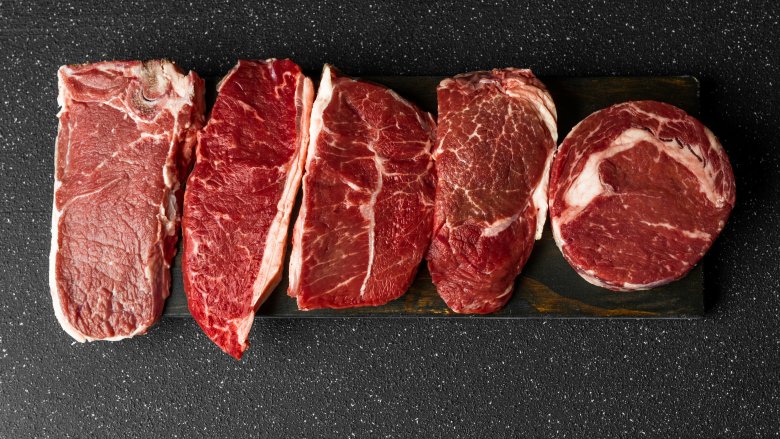The One Reason You Might Want To Skip Costco's Beef
Costco has just about everything you could ever want, including some of the biggest packs of fresh steaks you've ever had the opportunity to snatch up. While some find it too big a hit to the wallet to bulk buy prime cuts of pricey beef even at warehouse prices, there's another factor to consider that may keep you steering clear of the meat aisle at Costco altogether — they mechanically tenderize almost all of their steaks (via Chowhound).
This actually doesn't sound like a bad idea, in theory. Mechanically tenderized meat, also known as blade-tenderized meat, just means that the meat has gone through a machine that punctures it with small needles or tiny, sharp blades (via Cook's Illustrated). This helps break up the connective tissues and muscle fibers and renders the meat far more tender, juicy, and once prepared, delicious. Sounds good, right?
The problem is that this process has the potential to drive bacteria, including disease-causing baddies like E. coli, deep within the steak's interior where it can be more of a challenge to reach the proper temperature to cook up to a safe heat. The USDA, who in 2016 developed a rule requiring manufacturers to properly label meat that has been tenderized in this fashion, says that it's vital to cook blade-tenderized meat to at least 145 degrees to ensure that any potential bacterial contamination is eliminated.
This is not just a simple warning without cause, either. The Centers for Disease Control and Prevention tracks outbreaks of foodborne illnesses, including a multi-state E. coli outbreak that took place in 2009 and sickened 21 people. The investigation found that cases in six of the states involved were associated with non-intact steaks — otherwise known as blade tenderized.
Another investigation took place after a large E. coli outbreak was identified in 2012 in Canada. This outbreak included 18 people with lab-confirmed E. coli, five of which consumed mechanically-tenderized beef that came from one specific store.
But cooking the blade-tenderized meat to a safe 145 degrees isn't the end of the story — there's another step that needs to be taken to ensure your steak is cooked properly. The USDA notes that after removing the meat from your heat source, you should let it rest for at least three minutes, which will allow the internal temperature to continue to destroy potential pathogens.
In doing so, however, any benefits you'd get from having the meat mechanically tenderized is practically negated if you like your steaks rare or medium rare, because it is obviously very challenging to pop out a rare steak if you're cooking it to a safe 145 degrees. Your would-be tender, juicy steak will be firmly in medium-well territory once that rest period is over.
While the fact that the steaks are blade tenderized should give you pause as to whether you buy your hunks of steak from Costco or not, there are other factors to consider before plunking down cash. As Chowhound outlines, it isn't very clear where most of the meat from Costco comes from, especially as far as how the beef was raised before it became, well, beef.
There are other disadvantages, too. Unless you have a big cookout or gathering of people to feed, it's possible that you won't be able to use all that meat at once, and will be faced with the question about how to store it. Freezing is the best option when you need to save your meat to eat safely another day, but just throwing it into your freezer could leave you with a less-than-desirable steak when you thaw it out and cook it, since frozen-then-defrosted meat tends to experience a texture change.
All that said, Costco does everyone a favor and labels their meat that is tenderized in this manner so you don't have to try to figure out if there are teensy puncture marks on your potential meal (and really, it'll be impossible to tell, anyway). It might just be a better idea to skip their steaks altogether and opt for those that aren't mechanically tenderized if you prefer a less-cooked ribeye. If you're still dead set on Costco's beef, you can buy their whole roasts or loins — which definitely don't come cheap — but are not blade-tenderized.
